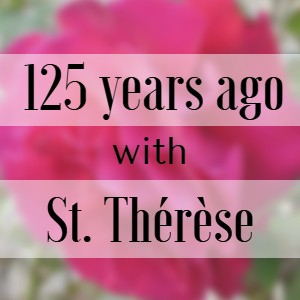125 years ago with St. Therese: "The Canticle of Celine," April 28, 1895

One Sunday in March 1895 Celine suffered a small disappointment that gave birth to Therese's longest poem, "The Canticle of Celine: What I Loved." Celine had entered six months before and was now a novice. Of course, she had some struggles in adapting to the minute rules of Carmelite life, which governed her smallest actions. (For examples, see the Paper of exaction on the Web site of the Archives of the Carmel of Lisieux, which gives much insight into the schedule and customs according to which Therese lived). Celine saw one of the first snowdrops in the garden of the Carmel and was about to pluck it when Therese reminded her: "You must ask for permission." Celine reports: "That I was no longer free even to pluck a tny flower was too much for me." In her cell, overcome with sadness, she wanted to write a poem to remind Jesus of everything she had sacrificed for him. Only these two lines came:
The flower that I pick, O my King,
Is You!
Over the next few weeks Therese wrote this canticle, incorporating Celine's couplet, to celebrate all that Celine had received in the past--the love of God, of her family, and of the natural world--and to insist that, in Jesus, she has them all again. She has lost nothing. Therese acknowledges that the poem is indebted to the Spiritual Canticle of St. John of the Cross. In it she recalls the same memories of her own childhood she has called to mind for the beginning of her memoir, which she is writing in these same weeks. It's a rich text to study Therese's relationship with creation. On April 28, 1895, Therese gave Celine a revised draft for Celine's 26th birthday.
Celine and Therese freely chose to become "prisoners in Carmel." In these days of the pandemic, when we ourselves are deprived of moving freely among the beauties of the world, the poem has special significance for us:
Jesus, you are the Lamb I love.
You are all I need, O supreme good!
In you I have everything, the earth and even Heaven.
The Flower that I pick, O my King,
Is You! . . .
Therese attached great importance to this poem. In March 1897 she copied a few verses for Maurice Belliere, her seminarian-brother, titling the synthesis "He Who Has Jesus Has Everything." The text of Therese's poems is available online thanks to the generosity of the Washington Province of Discalced Carmelites and the Web site of the Carmel of Lisieux. To understand the poems better, I recommend consulting the valuable introductions to them in The Poetry of Saint Therese of Lisieux, tr. Donald Kinney, O.C.D. Washington, D.C.: ICS Publications, Institute of Carmelite Studies, 1996, pp. 93-105. Learning the context helps to integrate your understanding of each poem into your knowledge of Therese's whole life.
Reader Comments